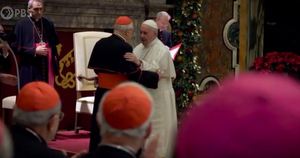PBS Announces Premiere Date for INSIDE THE VATICAN

Filmed over the course of the fifth year of Pope Francis's pontificate, INSIDE THE VATICAN provides rare behind-the-scenes access to one of the most important places in the Christian world. Nestled in the city of Rome, the Vatican is the headquarters of the Catholic Church and an independent city-state. From the Pope himself to the head of security, the nuns who serve the homeless, the choristers of the Sistine Chapel, the papal gardener, the chief of the diplomatic corps and many others, the film offers an inside look into the daily lives of those who live and work in the Vatican. Although the church calendar unfolds much as it has for centuries, it is also a time of dramatic change as the Pope introduces reforms, shakes up the clerical establishment and deals with the fallout of a sex abuse scandal that erupts just as he embarks on a historic visit to Ireland. INSIDE THE VATICAN premieres on Tuesday, April 28, 2020, 9:00-11:00 p.m. ET (check local listings) on PBS, pbs.org and the PBS App.
At the heart of the Vatican is St. Peter's Basilica. As Easter draws near, the Sanpietrini - skilled craftsmen responsible for its upkeep - are hard at work. For the Sanpietrini, this is not a routine job, but a vocation, a belief echoed by many Vatican workers. "The feeling you get goes beyond the job itself," says Andrea Benedetti. "For me, as a believer, to work in God's house is the greatest honor."
In anticipation of the arrival of tens of thousands of pilgrims, the Vatican Police Force makes stringent security checks. Ever since the assassination attempt on Pope John Paul II in 1981, security has been stepped up. "We are living in a time when terrorism - especially international terrorism - is growing," says Luca Cintia, Vice Commander, Gendarmeria. "It is undeniable that the Pope can be a target, as is the Vatican." But unlike his predecessors, Pope Francis likes to be amongst the crowds, which presents an often difficult challenge for Cintia and his team.
A reformer at heart, Pope Francis has changed the Church in ways both big and small. "There was a bottom-up movement in Latin America to transform people's lives," says journalist Christopher Lamb, "and Pope Francis comes from that tradition. He's not a liberal. He's not a conservative. He's a radical."
For centuries, Popes have lived in the Apostolic Palace, but Pope Francis resides in a modest apartment in the Casa Santa Marta. He has challenged attitudes on divorce and homosexuality and is not shy about confronting opponents. Critics question whether he should speak out on subjects such as immigration or climate change, but, leading by example, he has even set up a recycling center inside the Vatican.
However, change is difficult, and many are resistant to his new approach. "Making reforms," the Pope confesses, "is like cleaning the Sphinx of Egypt with a toothbrush."
One of the most essential tools of reform the Pope possesses is his power to appoint new cardinals, who will elect the new Pope at the next conclave. Breaking with tradition, Pope Francis appoints 14 new cardinals - not only from the centers of power in Europe and North America, but from countries such as Iraq, Madagascar and Pakistan.
"What Francis has done is TAKEN AWAY the rule book when it comes to appointing cardinals," says Lamb. "The Pope is thinking about appointing men who aren't the powerbrokers, the POWER PLAYERS in the clerical machinery. And it's as if he is saying that this is where the center of the Church should be - in these places that are often forgotten."
At the end of August, Pope Francis travels to Ireland, the first papal visit in 40 years. Two weeks prior to his trip, an explosive report alleged the cover-up of Catholic priest sex abuses in Pennsylvania, dating back decades. The report included evidence of more than 300 priests accused of abusing more than 1000 child victims. Everyone wonders if Pope Francis will address the issue in Ireland, the center of the child sex abuse scandals that have rocked the Church worldwide.
A week before Christmas, the Cardinals assemble inside the Vatican to hear from Pope Francis. His message is frank, and he speaks of the difficult times the Church is going through. But it is also a message of hope as he prepares to lead the Church away from the scandals of the past and into a more positive and progressive future.
INSIDE THE VATICAN is an Oxford Film and Television Production for BBC. The program is directed and produced by Silvia Sacco. Executive Producers are Sam Hobkinson and Nicolas Kent. Fatima Salaria and Simon Young are Commissioning Editors for BBC.
Comments
Videos

